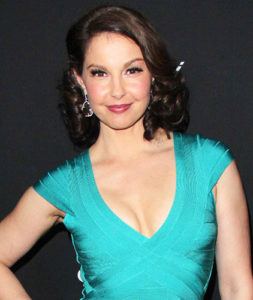This week I’m at the Western Social Science Association annual conference. I’m giving a presentation on the explosion of stories in the news media about sexual harassment by high profile men, especially those in the media industry. Rather than writing a conventional conference paper, I will have series of blog posts covering my topic over the next day or so.
Resetting the Agenda:
How Sexual Harassment & Assault
Became The Story of 2017 – Part 2
How the story broke – Ashley Judd:

Mandatory Credit: Photo by Jim Smeal/BEI/REX Shutterstock (2211284i)
Ashley Judd
‘Olympus Has Fallen’ film premiere, Los Angeles, America – 18 Mar 2013
While the story of women being sexually harassed and abused by powerful men had been slowly breaking further and further into the media for several years, the real explosion came when actress Ashley Judd went public with her story from two decades earlier.
Judd told the New York Times in early October, 2017 that she went what she thought was going to be a breakfast meeting at a hotel. She was instead sent up to Weinstein’s room where he greeted her wearing a bathrobe and suggested either he give her a massage or she could “watch him shower.”
It is at this point that we see the basic elements of the narrative coming through. Judd had to figure out how to get out of the room without alienating one of the most powerful producers in Hollywood.
The Times goes on to report that Weinstein reached “at least eight settlements with women,” paying them to drop their claims and keep their silence. When all of these stories started surfacing, Weinstein said in a statement to the Times:
“I appreciate the way I’ve behaved with colleagues in the past has caused a lot of pain, and I sincerely apologize for it. Though I’m trying to do better, I know I have a long way to go.”
He also said, through his lawyer, that “he denies many of the accusations as patently false.”
So again, why did these stories start breaking now? Judd said,“Women have been talking about Harvey among ourselves for a long time, and it’s simply beyond time to have the conversation publicly.”
Judd had previously talked about what had happened with Weinstein back in 2015 with Variety magazine, but she didn’t name him.
Judd told Variety she felt bad because she didn’t do antying about it at the time:
“I beat myself up for a while. This is another part of the process. We internalize the shame. It really belongs to the person who is the aggressor. And so later, when I was able to see what happened, I thought: Oh god, that’s wrong. That’s sexual harassment. That’s illegal. I was really hard on myself because I didn’t get out of it by saying, ‘OK motherf—er, I’m calling the police.’”
The common theme between Judd and the other women who say Weinstein abused or harassed them was that women didn’t speak out because they didn’t know each other, didn’t live in the same cities. But while they didn’t talk about it publicly, they did talk about it among themselves.
So what kept the stories silent?
- Many of the women were embarrassed that this had happened to them and sometimes wondered whether they were responsible for what had happened to them.
- They still wanted to work where they worked. They wanted the access the abuser gave them.
- They were afraid they would get blacklisted in some form if they spoke out. (Something that happened with several of HW’s victims.)
- They were afraid they wouldn’t be believed.
Sexual Harassment & Assault:

Very well done p1 Ralph.
Thanks! The whole piece is live now.